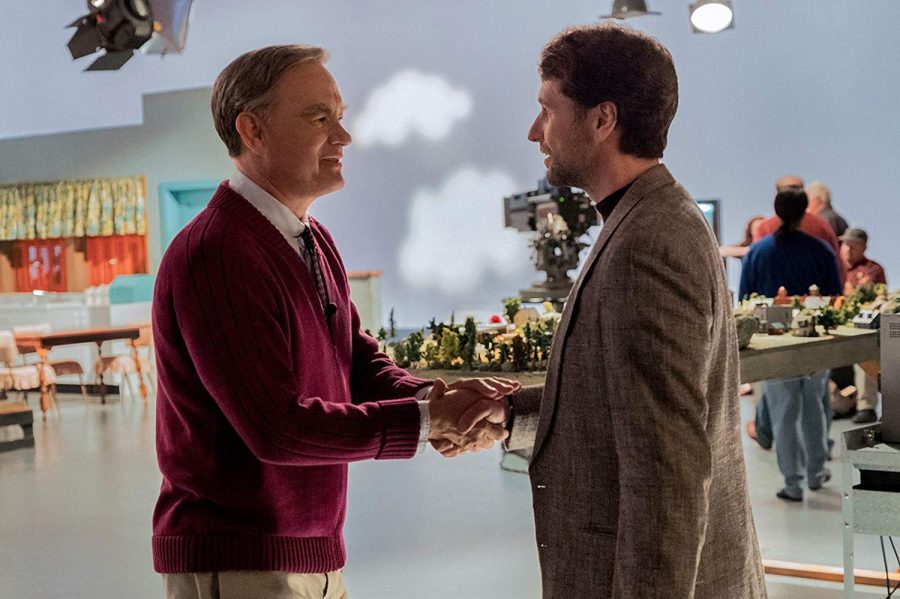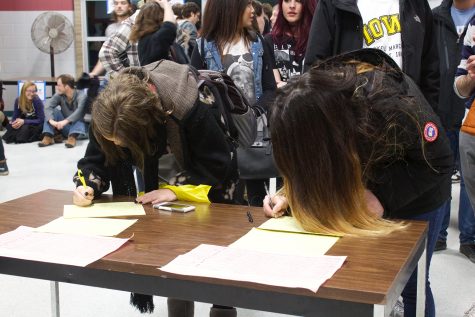Opinion: A Beautiful Day in the Neighborhood displays magic that transcends generations
The Mr. Rogers biopic brings joy for those who remember the iconic show and a kindled hope for those who don’t.
Reassuring television host Fred Rogers (Tom Hanks) meets skeptical journalist Lloyd Vogel (Matthew Rhys) in director Marielle Heller's unconventional biopic, "A Beautiful Day in the Neighborhood." [Lacey Terrell/Sony Pictures/TNS]
December 3, 2019
Although I spent my childhood watching Dragon Tales and Blue’s Clues — often with a frosted, sprinkled donut in hand — I was truly touched and in awe while diving into Mr. Rogers’ world in A Beautiful Day in the Neighborhood.
I had nothing to reminisce as the puppets Daniel Tiger and King Friday XIII came on screen, but my face hurt long after I left the theater from smiling so much. I believe that’s the magic of Mr. Rogers. He didn’t transform people’s lives simply because he was a fond memory, but because he was a rare spirit who loved unconditionally.
The film itself is a time capsule as it roots us in the year 1998, focusing on the development of the iconic Fred Rogers Esquire profile “Can You Say…Hero?” The journalist, Tom Junod, has a reputation for writing articles on people that do little to flatter their image, but with a subject such as Rogers, Junod’s life is forever changed.
In this very article, Junod wrote, “There was an energy to [Rogers] … a fearlessness, an unashamed insistence on intimacy.”
This was incredibly evident throughout the film, a characteristic that often made the actor’s portrayal of Junod uncomfortable or even angry. But this same persistence broke down the walls Junod built out of anger toward his life and relationships.
Yet, this wasn’t the incentive behind Roger’s compassion. There were no ulterior motives, no disguise of caring in order to access information. The people he helped were not just checked boxes to fuel his own sense of altruism, but people he truly cherished — people who he welcomed into his neighborhood.
He didn’t transform people’s lives simply because he was a fond memory, but because he was a rare spirit who loved unconditionally.
There are several scenes that will make you tear up, and make you laugh. But the one that stands out to me actually came as a bit of a surprise. Nothing too astonishing happens, but tears streamed down my face nonetheless.
In a restaurant, Rogers asks Junod to take a minute of silence to think of all of the people who have helped him become the person that he is today. As Junod begrudgingly agrees, the crowded café slowly falls silent, too.
Within these 60 seconds, it becomes clear just how much of an impact Rogers has on the world. Although a small pool of people, he was able to make all of them take a step back from their daily motions and mindless chatter to think deeply and meaningfully about who they hold dear.
Perhaps it’s the idea of seeing someone wearing their heart so unabashedly on their sleeve. Or the fact that Rogers patiently sat with kind eyes as Junod began to break down across the table.
But to be quite honest, I think the power of A Beautiful Day in the Neighborhood — and the power of Mr. Rogers — lies in how the world can truly be such a wonderful place if we just choose to embrace the shared beauty in humanity.
As Rogers once said, “The world needs a sense of worth, and it will achieve it only by its people feeling that they are worthwhile.”
Columns reflect the opinions of the authors and are not necessarily those of the Editorial Board, The Daily Iowan, or other organizations in which the author may be involved.


















